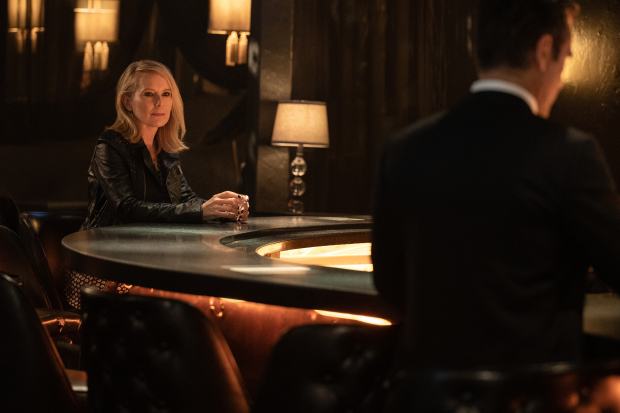For a pop-cultural century, in words and images, Los Angeles has been depicted as a seductively alien locale not like any other place in the galaxy. Its natural disaster quotient, its sterling variety of photogenic backdrops for moral rot and a wide world of sleaze, the sun, the secrets — all of it spells camera-ready trouble in paradise.
Its strangeness was made for, and by, film noir. Here’s one example: the Apple TV+ offering “Sugar,” starring Colin Farrell as a mysteriously well-off private eye specializing in missing-person cases. Creator and lead writer Mark Protosevich’s slippery fish of an eight-part series, with its first two episodes premiering April 5, owes debts all over town — to the legendary movies beloved by the title character, and to LA’s infinite capacity for new wrinkles along familiar fault lines.
There’s a whopper of a reveal at the story’s three-quarter juncture, so we’ll avoid that for a few paragraphs (no spoilers, though). We meet Farrell’s character, John Sugar, in a black-and-white Tokyo prologue, as he successfully if violently resolves the kidnapping and ransom case of a yakuza’s young son. Locating the missing, he murmurs in archetypal noir voiceover, makes for “a tough business. But steady.”
The rest of “Sugar” unfolds mostly in color, and in greater as well as much, much lesser Los Angeles. Sugar’s new case involves the apparent disappearance of 25-year-old Olivia Siegel (Sydney Chandler), tarnished Hollywood royalty. She’s the daughter of movie director Bernie (Dennis Boutsikaris, a casual, wry sort of skeeze). Olivia’s actress mother, as we’re told, died in a car accident in 1998. The family scion and true legend, producer Jonathan Siegel (James Cromwell), hires Sugar for the search-and-rescue job, staying classically tight-lipped about his motives, though he’s frank about his pampered offspring, notably grandson and one-time child actor David (Nate Corddry).
Clearly Sugar’s hourly rate exceeds the average gumshoe’s. When in LA, he lives his monastic private life in a swank hotel, meeting with his apparent agency boss Ruby (played by the actress Kirby, who’s terrific) while tooling around town in a sleek blue Corvette. Ruby’s concerned about his health, and how this particular case might mess with this distinctly proper and contained man’s guarded psyche. In teasing half-fragments, the series tells us Sugar’s sister too went missing, once upon a time, and he’s coping uneasily with the trauma.
The labyrinth takes the detective into dark corners and other brutal disappearances all over the county. Amy Ryan, who excels in the role of a Joni Mitchell-type rock legend and Bernie Siegel’s ex-wife, becomes Sugar’s confidante and sounding board. Creator Protosevich treats this character’s struggles with addiction and recovery seriously and effectively; likewise, a #MeToo scandal enveloping the Siegel family develops into more than mere topical referencing. It’s at once plausible in the context of the story, and nicely threaded in the middle episodes. Fernando Meirelles (“City of God,” “The Constant Gardener”) directs five of the episodes with a fine eye for the destablizing composition; veteran TV director Adam Arkin handles the other three.
And now, obliquely, let’s deal with the whopper at the end of Episode 6. While “Sugar” strategically drip-drip-drips its hints regarding the detective’s past, and the nature of his organization’s larger mission, the reveal itself is nutty enough to toss a fair percentage of viewers overboard. It’s a testament to the series’ strengths — strong, steady performances; a nice glare and gloss to the imagery — that it very nearly recovers from the whopper.
After watching all eight segments, I felt differently about it, more accepting, I suppose. Other things bugged me more: the narrative’s wearying reliance on girls-in-torture-dungeons depravity, for one, and the well-motivated but nonetheless indulgent reliance on snippets from dozens of famous and less-familiar Old Hollywood titles, from “Sunset Boulevard” to “Vertigo” to “Kiss Me, Deadly.” These serve as attractive but clunky complements to Sugar’s own observations about the movies he adores, and the city he barely comprehends.
So it’s a bag you might call mixed. But I found a lot of it absorbing, and nearly every performance first-rate. Did I buy it? Uh, most of it? None of it? Enough of it? Something like that, yes. If enough viewers go for the twist, well, the open-ended ending of “Sugar” sets up a second season with ease.
“Sugar” — 3 stars (out of 4)
Rated: TV-MA (for violence, language, some nudity)
Running time: Eight episodes, about four-and-a-half hours total
How to watch: Apple TV+
Michael Phillips is a Tribune critic.



